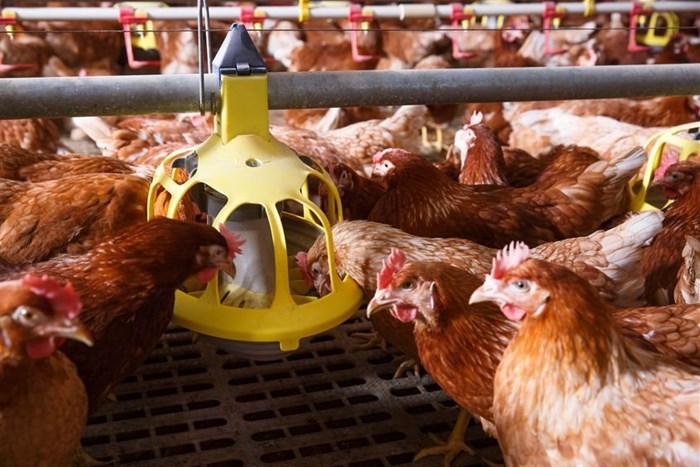






Over the same period, the industry was able to grow from R56bn per annum to R59bn per annum.
"This is fantastic because the sector’s growth remained stagnant for a decade before the signing of the Poultry Sector Masterplan in 2019," Izaak Breitenbach, general manager of the broiler division of the South African Poultry Association (Sapa), told journalists during a virtual meeting. The significant growth rate was mainly due to investments in the industry.
"The master plan had called for an investment of R1,5 billion to be concluded by 2022. However, South Africa’s poultry industry has already invested R1,8bn, with an additional R600m earmarked to be invested by the end of 2024."
While Saoa was confident that the long-term outlook for the poultry sector was very good, the short-to-medium-term forecast was rather bleak, Breitenbach added.
On the international front feed, prices skyrocketed due to reasons such as Russia’s invasion of Ukraine and drought in crucial grain-producing countries. Furthermore, avian influenza has crippled production across the globe.
In 2021 the South African broiler industry was able to improve its efficiencies in strides according to a competitiveness study that Dr Tracy Davids, manager of the commodity markets division of the Bureau of Food and Agricultural Policy (BFAP), conducted over December 2022.
BFAP compared the South African industry to other leading countries, including the Netherlands, Poland, Germany, the United States (US), and Brazil. Furthermore, the BFAP report tracked the evolution of the broiler industry from 2015 to 2021.
“While it must be acknowledged that Russia’s invasion of Ukraine in February 2022 and the subsequent ongoing war in the Black Sea region has exacerbated many of the challenges faced by poultry producers globally, BFAP’s assessment is based on information from 2021 and therefore does not include the influence of the war,” Davids says.
“The team found that South Africa was able to improve its feed conversion ratio by 5,8% from 2017 to 2021, making it the most efficient producer, because it was able to achieve the lowest feed conversion ratio of all the countries in the sample.”
“South African producers remain competitive and were shown to produce a kilogram of chicken meat at a lower cost relative to the European producers included in the sample, but also at a higher cost than leading exporters such as the US and Brazil. This difference in relation to Brazil and the US declined in 2021 relative to 2017,” Davids says.
Highly pathogenic avian influenza (HPAI) has decimated poultry flocks across the globe.
“Since February 2022, the US has culled 58 million birds due to outbreaks among chicken flocks,” Breitenbach said, adding that this number was still rising as outbreaks are ongoing.
In the EU, 37 countries had to cull a combined 50 million birds over the past year and outbreaks are also still being reported daily.
The local industry also had to cull over three million birds last year. “We need to keep in mind that these birds aren’t broilers, but breeding stock," Breitenbach said. Breeding stock are used as layers for the poultry industry and therefore the loss of parent stock has a greater implication with regards to replacement.
Most recently, Argentina had to suspend exports recently after that country confirmed its first HPAI outbreak.
"HPAI has a devastating effect on any country’s export and therefore the local poultry industry is waiting with bated breath to see what the impact of Argentina’s suspended exports to South Africa will be," said Breitenbach.
Globally there is agreement that a fundamental policy shift from culling towards vaccination was needed. "The problem with this policy shift isn’t due to technical constraints, but rather international trade issues,” Breitenbach said, due to countries' different stances about residues and other factors. "Locally all members of Sapa, as well as the South African Veterinarian Association (Sava) are in support of the idea that all flocks should be vaccinated, except those earmarked for exports.”
Sapa hopes to meet with the Department of Agriculture, Land Reform and Rural Development (DALRRD) soon to discuss this shift in policy.
Seventy KFC fast food restaurants were left without stock over December due to the national electricity provider’s decision to implement load shedding at stage 5 and higher.
In general, load shedding has also directly increased the average input price for farmers to grow their birds by approximately 75c/kg. "We’ve already seen many smaller producers go out of business," Breitenbach said.
To address the issue, industry met with minister Thoko Didiza six weeks ago to discuss what industry, government and Eskom could do to address load shedding within the food sector due to a serious concern for food security and cost.
A task team was called to life and after investigating the issue, they made two proposals. One entails relief in terms of taxes on diesel for electricity generation.
The second relates to subsidies for the implementation of solar systems for solar houses. "While we are grateful for the rebates introduced by the finance minister during his budget speech, this is not within the reach of small farmers, who don’t have access to financing for this level of debt," Breitenbach said.

AgriOrbit is a product of Centurion-based agricultural magazine publisher Plaas Media. Plaas Media is an independent agricultural media house. It is the only South African agricultural media house to offer a true 360-degree media offering to role-players in agriculture. Its entire portfolio is based on sound content of a scientific and semi-scientific nature.
Go to: http://agriorbit.com/